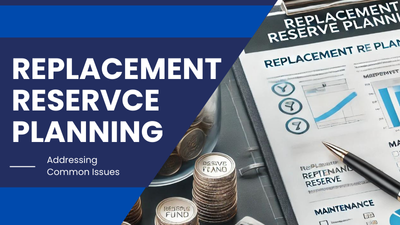
How to Address Common Issues in Replacement Reserve Planning
- August 22, 2024
- OHI

Replacement reserve planning is a crucial aspect of property management that ensures funds are available for future repairs, replacements, and upgrades of property components. However, several common issues can arise in this process, potentially jeopardizing the financial stability of a property. Addressing these issues effectively is essential for maintaining the long-term health and value of the property. This blog explores common issues in replacement reserve planning and offers strategies for addressing them to ensure robust and effective reserve management.

One of the most significant issues in replacement reserve planning is inadequate estimation of reserve funds. This problem can arise from underestimating the cost of replacements, failing to account for inflation, or not considering the full lifecycle of property components.
How to Address It:
Another common issue is insufficient reserve contributions. This can occur when property managers or owners fail to set aside enough funds regularly, leading to a shortfall when replacement needs arise.
How to Address It:

Lack of transparency and reporting can lead to misunderstandings and mismanagement of reserve funds. Without clear reporting, property owners and stakeholders may not have a complete view of the fund’s status or how it is being utilized.
How to Address It:
Ineffective management of reserve funds can undermine their purpose. Issues such as poor investment strategies, misallocation of funds, or lack of oversight can lead to insufficient reserves when needed.
How to Address It:
Failure to update reserve plans can result in misalignment between reserve funds and current property needs. Changes in property conditions, replacement costs, or regulatory requirements may necessitate adjustments to the reserve plan.
How to Address It:
Focusing solely on immediate or short-term needs can lead to overlooking long-term maintenance requirements. This approach can result in inadequate reserves for future replacement or significant repairs.
How to Address It:

Unexpected events, such as natural disasters or emergencies, can create additional financial demands on reserve funds. Failure to account for these events can lead to insufficient reserves when such situations arise.
How to Address It:
Inconsistent reserve fund practices can lead to confusion and mismanagement. This issue may arise from varying approaches to reserve planning, contributions, or reporting.
How to Address It:

Addressing common issues in replacement reserve planning is essential for ensuring the long-term financial stability and success of property management. By tackling issues such as inadequate fund estimation, insufficient contributions, lack of transparency, and ineffective management, property managers and owners can build robust reserve funds that support future repairs and replacements. Implementing best practices, such as thorough assessments, strategic investment, regular updates, and contingency planning, helps optimize reserve management and ensure that funds are available when needed. Effective replacement reserve planning not only preserves property value and functionality but also contributes to overall financial health and sustainability.
Contact us for a customized NO OBLIGATION proposal for outsourcing your accounting activities.









